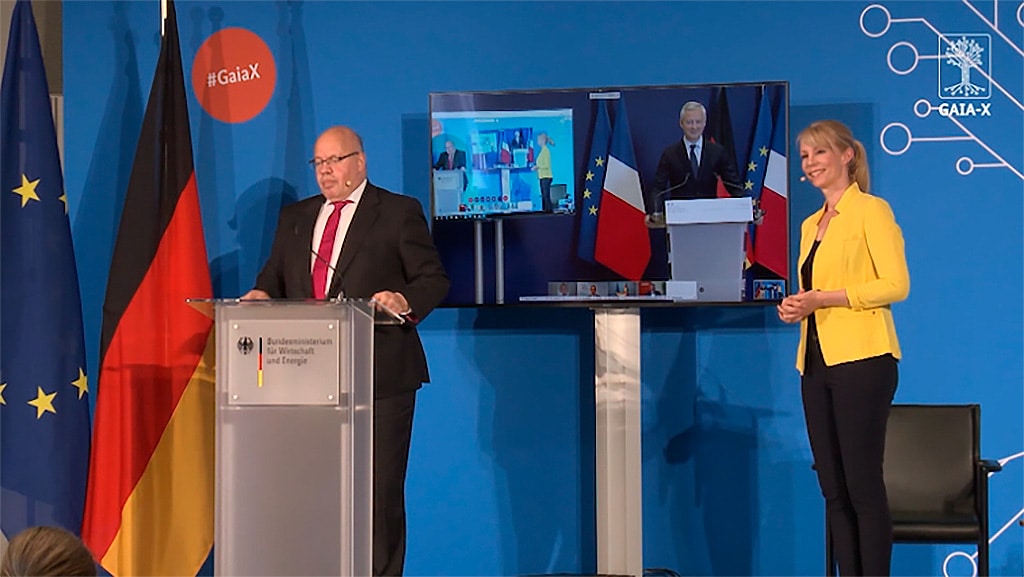
Winston Churchill stated that “it is always wise to look ahead, but difficult to look further than you can see”. Current times praise this quote: we live in a scenario of technological somnambulism, a stage with no total awareness and knowledge about transformation process that technology is producing in our society. The 21st century’s strategic asset lies in data, and its governance is fragmented and polarised though.
Europe does not want to get left behind. On 4 June 2020, the German Economy Minister, Peter Altmaier, announced the launch of GAIA-X, a cloud data infrastructure which will become the starting point of a European data ecosystem. The EU already vindicated in its European Data Strategy –released in February 2020– the need for turning the Union into a reliable, trustworthy partner at the global level, through the setting-up of data ecosystems, both of excellence and of trust. Even though the initiative does not refer to this, this initiative aligns with the idea that data is not just a means –an economic growth driver through open data market spaces across sectors–, but it is also principle and ultimate purpose alike –data must be created, applied and used, abiding by standards of non-discrimination, transparency, accountability, and human oversight.
GAIA-X does not only mean the beginning of a European data ecosystem. It is also foreseen as an alternative to cloud services offered by the U.S. and Chinese giants. This explains why GAIA-X, based in Belgium and led by Germany with France’s support, will initially engage 22 companies based in France and Germany, with the participation of two coming originally from Spain: Amadeus and Gigas, the latter one participating through CISPE, the Cloud Infrastructure Services Providers in Europe.
These companies will take part of this platform –which is neither a new operator nor a data centre–, becoming a space for suppliers to offer cloud services and for business to search for storage data providers. The common goal is to ensure all companies comply with European standards on digital sovereignty, data availability, interoperability, portability, transparency, and fair participation.
The geopolitical construct of data
Bruno Le Maire, French Minister for Economy and Finance, pointed out: “We are not China. We are not the United States. We are European countries with our own values”. GAIA-X’s launch at present has been not only suitable because of pandemic trends on digitization acceleration and growing risks related to cyber security, but also because this platform paves the way towards the EU-sought technological sovereignty. It is defined as a project by Europe for Europe.
Up to now, European efforts devoted to not positioning on any of digital fiefs –United States and China– were addressed through laws, such as the General Data Protection Regulation (GDPR), tax charges, or sanctions, among others. Currently, GAIA-X sends the message that the EU is searching for its strategic autonomy in the digital arena, not just by protecting it, but also by reinforcing it. As the EU Council’s conclusions on Shaping Europe’s Digital Future remarks, the EU is searching for the leadership of international value digital chains as key elements to ensure strategic autonomy, global competitiveness, and sustainable development. To do so, with regards to data, individuals, employers, and companies in Europe should retain control over their data. The goal: strengthen and turn Europe into a suitable place for sharing, protecting, storing, and using data. The means: information sharing on best practices and methodologies amongst Member States and the Commission, as well as information sharing on EU’s risk coordinated assessments about high-risk suppliers for key strategic, critical, or sensitive assets.
However, opinions differ on this issue. Josep Borrell, the High Representative of the EU for Foreign Affairs and Security Policy, and Thierry Breton, European Commissioner for Internal Market, wrote a few days ago that “the era of conciliatory, if not naïve, Europe has come of age”. According to them, soft power is no longer enough, and it needs to be complemented with a “hard power” dimension –not just in terms of military power and defence. With this statement, they pointed to the need for resilience and autonomy as the pathway for the Union to ensure data and essential infrastructures’ protection for society, by using a stronger leadership as a Union to contribute to global system’s balance. Meanwhile, in this same week the General Director of the Telecommunications Network Operators’ European Association, Lise Fuhr, stressed out in a conference that digital leadership cannot be seen as an “us vs. them” trajectory. According to her, openness is at the core of leadership on technology, regardless of where they come from, offering value added to Europeans.
Challenges to be solved, and the future
This divergence expresses that GAIA-X, which emerges from an ambitious public-private project, requires still solving a series of questions. The first is how this platform will be able to overcome distribution capability of U.S. and Asian infrastructures, which up to now have controlled the overall European data market, including the very European Commission with Amazon Web Services. In February 2020, Microsoft revealed that it held discussions with the German Ministry of Economy in order to offer GAIA-X an appropriate, well-executed technology architecture. There is also certain scepticism on whether including non-European suppliers: the GDPR was jeopardized with the United States’ CLOUD ACT, which allows federal law enforcement to compel U.S.-based technology companies to provide requested data stored on servers regardless of whether the data are stored in the U.S. or on foreign soil. Additionally, some U.S. suppliers, such as Microsoft and Amazon, operate in the EU through European branches.
The success of this project will heavily depend on technical details –which have not yet been published. These details will allow delving into the framework of the very European data ecosystem. The content of this framework will be developed over time. At present, the EU’s challenge lies in moving forward such ambitious project –which has significant implications on reconnecting the rural Europe or addressing challenges envisioned by the latest 2020 Digital Economy and Society Index– through a multi-level governance approach, in which governments, research centres and companies will need to agree upon, not only technical and economic outcomes, but also diplomatic, political, and social goals.


